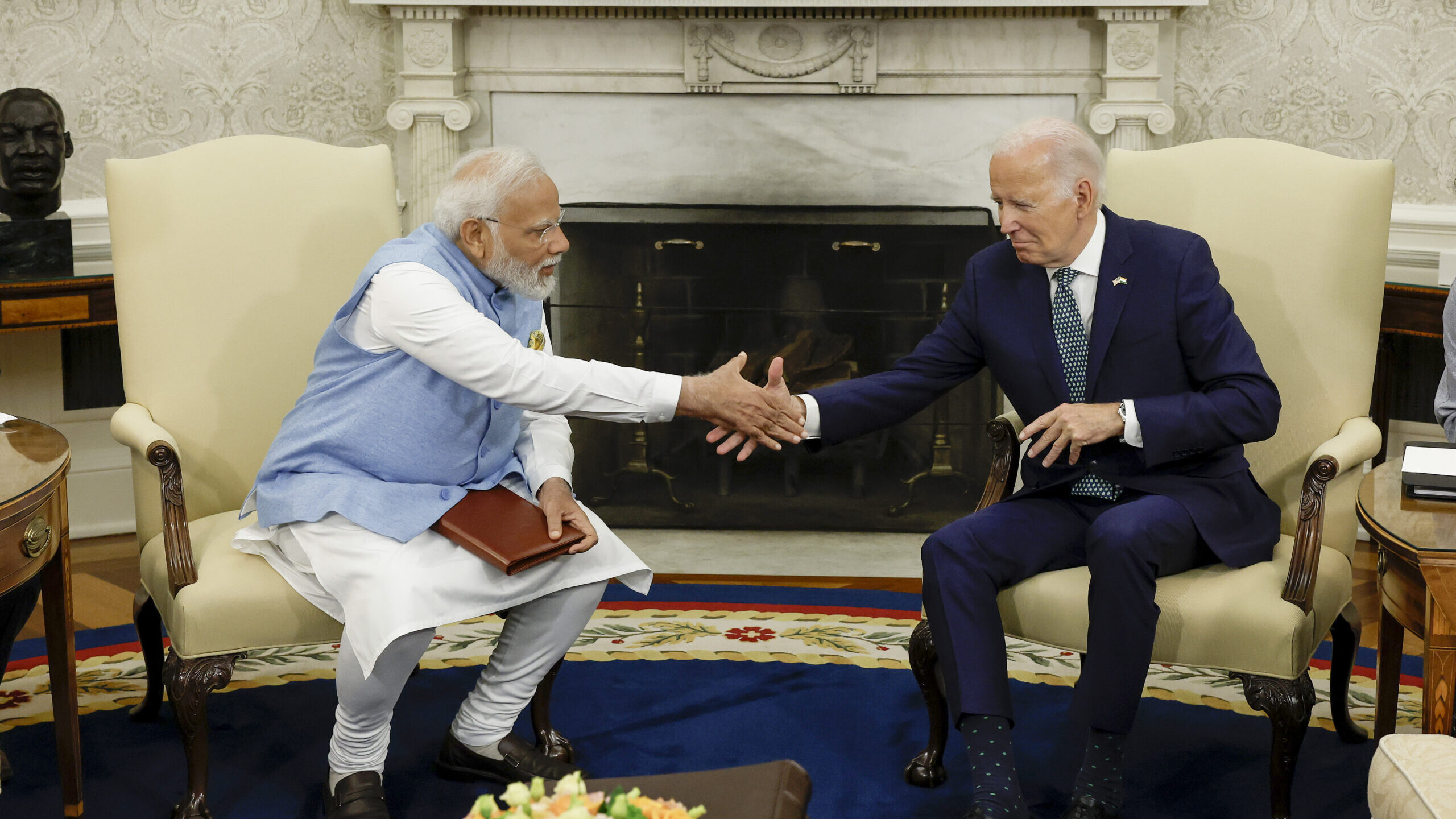
U.S. President Joe Biden (R) and Indian Prime Minister Narendra Modi meet in the Oval Office at the White House on June 22, 2023 in Washington, DC. (Photo by Anna Moneymaker/Getty Images)
Updated 06/21/2023 at 2:00 pm ET to reflect the official announcement.
WASHINGTON — India has signed the Artemis Accords designed to set norms for exploration and exploitation of the Moon, Mars and potentially mineral-rich asteroids, in what Biden administration officials and experts say is a strategic win for US space policy.
“India signing the Accords is a transformative moment for the Accords and the Artemis program,” Mike Gold, a former NASA official who did much of the original negotiating on the accords, told Breaking Defense.
The signature was formally announced by Indian Prime Minister Narendra Modi and US President Joe Biden in a press conference this afternoon. The deal came as part of a package of agreements inked during Modi’s first official state visit to Washington that began Wednesday.
“By taking the decision to join the Artemis Accords, we have taken a big leap forward in our space cooperation. In fact, in short, for India and America’s partnership, even the sky is not the limit,” Modi said.
Modi met with Biden this morning, and tomorrow will attend a lunch meeting with Vice President Kamala Harris, who chairs the National Space Council, and Secretary of State Antony Blinken, whose department is leading the Biden administration’s charge to establish international norms of behavior for military space activities.
In particular, officials and experts said, New Delhi’s adherence to the Accords represents a boost to US efforts to rally allies to help counter China’s expansion of its own civil and military space activities, as well as Beijing’s use of space as a soft-power tool on the global stage. India long has seen China as its key geopolitical rival — for example joining the US, Australia, and Japan in the Quadrilateral Security Dialogue, commonly known as the Quad, in 2007.
India’s signing of the Artemis Accords “takes forward what India can do within platforms like the Quad — an earlier Quad statement said that the Quad partners will partner with each other in terms of global rules of the road for outer space — this is a concrete action of that position that India signed on to in the Quad statement,” explained Rajeswari Pillai Rajagopalan, director of the Center for Security, Strategy & Technology at the Observer Researcher Foundation in New Delhi, in an email.
Victoria Samson, head of Secure World Foundation’s Washington office, said that the move is “significant because it is a step toward the US approach to the Moon, not China’s. Space has long been used as a form of soft power outreach, and frankly China has been excellent at doing that lately. … The Artemis Accords are, in their own way, a form of soft power outreach by the US too.”
India, like China, further has been rushing to enhance its space prowess and power — building up its military and laying out an ambitious civil exploration program. India also belongs to the small club of nations that have tested anti-satellite missiles, joining the US, Russia, and China in 2019 with Mission Shakrit, which destroyed a test satellite using a modified version of the Privthi ballistic missile.
“India is already proceeding with lunar and Martian exploration, therefore, India committing to the principles of the Accords is a vital step forward toward achieving the Artemis vision of a peaceful, transparent, and collaborative future in space for all of humanity to enjoy,” Gold said.
New Delhi long has been famous for avoiding strong space policy ties with either the US or Russia, and for the adamant independence of both its civil and military space development efforts.
“This is a big deal! … India has long seen itself as an important counterweight to geopolitical rivalries,” said Samson, whose organization for several years has been working the Indian government and non-governmental organizations on space sustainability and security issues.
Further, India has been wary of voluntary accords for fleshing out international space policy, instead favoring the creation of a body of international law to govern global space activities. For example, New Delhi for many years has advocated for a legally binding treaty to prevent the weaponization of space to be negotiated at the Conference on Disarmament in Geneva.
Signing the Artemis Accords thus is “indeed a very big deal as it is a general departure from the way India [has] managed international space treaties and negotiations,” Pranav Satyanath, a research associate at the Council for Strategic and Defense Research in New Delhi, tweeted today. “India has a distinct preference for legally-binding instruments for both civilian and military-related space activities.”
India is the 27th country to sign the accords, which US officials see as a key component in Washington’s overarching strategy to reduce the potential for future conflict in space as countries scramble for access to orbital real estate (including around the Moon in cislunar space) and, in the future, resources like water and strategic minerals.
Ecuador just Wednesday inked the Accords themselves, in a signing ceremony at the country’s embassy here.
“India and Ecuador together demonstrate the breadth of the Artemis Accords, which is fueled by global diversity and determination to boldly go to the stars in peace,” Gold said.








